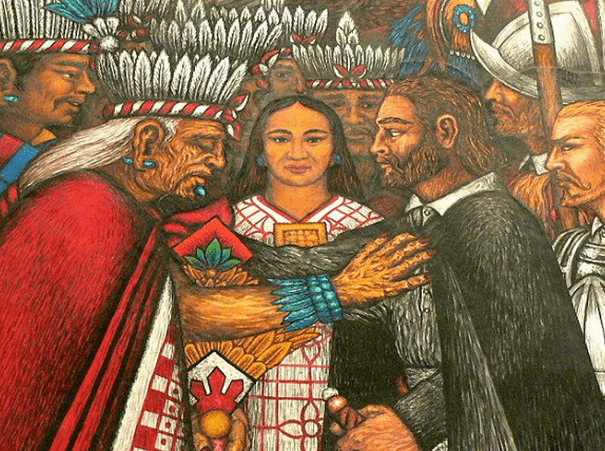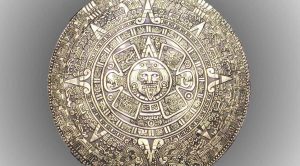Winner of the Fall 2016 StMU History Media Award for
Best Article in the Category of “People”
Best Article in the Category of “World History”
Largely due to the importation of disease and use of superior weapons, the Spaniards were able to conquer the Aztec capital of Tenochtitlan, kill the empire’s last emperor, Cuauhtémoc, and bring the Aztec empire to an end. Few know of La Malinche, the indigenous interpreter of Hernán Cortés, whose linguistic abilities were used to facilitate important conversations between the Spaniards and the indigenous leaders. Without the help of La Malinche, perhaps the Aztec empire would have survived.
Born between 1502 and 1505, La Malinche was named Malinalli Tenepal, the first part of her name being a Nahuatl term for the twelfth day of the month in correspondence to the Aztec calendar, and the second part of her name meaning “lively.” She was born of nobility in Paynala within the region of Veracruz. Her troubles started at a young age after the death of her father. La Malinche was ousted from her home to ensure her new half-brother received the inheritance of the family instead of her, since she was the eldest child. She was given to “some Indians of Xicalango.”1 Then the Indians gave her to a nobleman in Tobasco, a region in the Yucatan. When Cortés arrived to Tobasco, he was offered twenty slaves, one of them being La Malinche. Having lived in Veracruz, a Nahuatl-speaking region, and then being sold into a Maya-speaking region, La Malinche knew both languages and she was soon recognized for the linguistic talents that could benefit Cortés in his conquests.2

The few glimpses of La Malinche and how her presence as an interpreter accelerated the fall of the Aztec empire can be found in the writings of the Spanish explorers, specifically from Hernán Cortés, her “lord and master.”3 From the second letter Hernán Cortés wrote to Emperor Charles V, dated October 30, 1530, Cortés speaks of La Malinche as “a female interpreter that I had, who was a native of this country, and whom I obtained at Putunchún on the Rio Grande.”4 This confirms the vague aspects of her life that we already know. But most importantly, in this context, this letter goes on to tell of a scenario in which La Malinche saved the Spaniards from an ambush by the Cholulans. La Malinche was told by the wife of a native leader that they planned to attack the Spaniards and if La Malinche came with them, she would be protected. La Malinche delivered this message to Cortés, which ultimately led to the massacre of Cholula and provided a direct path to march towards Tenochitlan, the capital of the Aztec empire.5 This leads to the question of whether or not La Malinche was a traitor or a survivor. Did she explicitly want the Aztec empire to fall or did she just want to save herself from the carnage?
With no traces of primary sources from La Malinche herself, her story has been retold by various scholars without much consistency, nothing ever being certain. Up until the twentieth century, La Malinche was viewed as a traitor to her country Mexico. In 1861, on the celebration day of Mexico’s Independence, Ignacio “El Nigromante” Ramírez, a Mexican journalist, addressed the Mexican people by saying, “One of the mysteries of fate is that every Mexican owes his downfall and disgrace to a woman, and to another woman his salvation and glory; the myth of Eve and Mary is reproduced everywhere; we indignantly remember Cortés’s mistress and will never forget, in our gratitude to Doña María Josefa Ortiz.”6 La Malinche is seen as playing a key role in the subjugation of the Mexican peoples to Spain, while Doña María Josefa Ortiz did the contrary and liberated the country. However, many Chicana writers and modern scholars are trying to rewrite the tale of La Malinche to understand the complexities of her choices and to vindicate her. For example, Gloria Anzaldua promotes the idea that La Malinche had a “new consciousness,” that she voluntarily served as the interpreter of Cortés not only to save herself, but also because she knew that a new mestiza culture was going to be born (especially considering she had a son with Cortés in 1524).7 She made a conscious effort to exchange language and cultural aspects from each side in order to facilitate the emergence of the new mestiza society; however, with that came brutal consequences in the shape of warfare and mass death in the New World.
Whether or not La Malinche’s role as Cortés’s interpreter was traitorous, simply an effort to survive, or some other complex reason involving love for Cortés, hate for the Aztec empire for the cruelty she faced after being ousted from her home, or promotion of the new mestiza culture, no one will ever know the true story of the Indian, slave woman who traveled alongside Cortés towards the culmination of the Aztec empire.
- Bernal Castillo del Díaz, The Discovery and Conquest of Mexico, 1517-1521 rev. American ed., trans. A.P. Maudsley (New York: The Noonday Press, 1965), chap. 22-23. ↵
- Pilar Godayol, “Malintzin/ La Malinche/ Doña Marina: re-reading the myth of the treacherous translator,” Journal of Iberian and Latin American Studies 18, no. 1 (April 2012): 61-68. ↵
- Castillo del Bernal, chap 23. ↵
- Hernan Cortes to Emperor Charles V, October 30, 1520, in Letters of Despatches of Hernando Cortes, to the Emperor Charles V., trans. (New York: Wiley and Putnam, 1843), letter II. ↵
- Hernan Cortes to Emperor Charles V, October 30, 1520, in Letters of Despatches of Hernando Cortes, to the Emperor Charles V, letter II. ↵
- Rosario Pérez-Lagunes, “The Myth of La Malinche: From the Chronicles to Modern Mexican Theater” (PhD dis., Virginia Polytechnic Institute and State University, 2001), 24. Although she was of Spanish descent, Doña María Josefa Ortiz was born in Valladolid, Mexico in 1768 and identified herself as Mexican. She and her husband were both a part of the rebellion that ultimately led to Mexico’s independence from Spain in 1824. ↵
- Godayol, 68-70. ↵



230 comments
Carlos Hinojosa
I honestly have heard of her before a long time ago but this Article did a pretty good job reexplaining it to me. I believe she wasn’t a traitor because you can’t be a traitor to people that betrayed you first. I would out the Aztec’s too if they did that to me and being constantly abused like that. The article did an amazing job showing the different reasons why La Malinche did what she did
Zoe Aguirre
This Article is very gripping. The Author gives us this thought-provoking insight with what little knowledge is known about La Malinche. Whom has been portrayed as a traitor is now being revisited and by many scholars is now being placed in this new light as a survivor. Mariana Sandoval leaves out any personal opinions and leaves it up to us with the research she has gathered to actually think for ourselves whether there was an ulterior motive for La Malinche to help Cortez take down the Aztecan Empire or her only ay to survive. Congratulations to the author for the awards received for her article.
Tomas Salazar
It is very difficult to label la Malinche as a traitor or a survivor. She made a decision she thought in her head was the right one to make. The decision of her being a traitor or a survivor is truly subjective. I imagine she was under an immense amount of pressure on what decision to make, ultimately she choose to inform Cortés about the attack from the Cholulans.
Amelie Rivas-Berlanga
With the little information that is found about La Malinche it sounds like she was a loyal translator to her “master”. She seems more of a survivor to me, because she did what she had to do. I can not believe how difficult it was for her to make that decision. Everything happens for a reason, and that’s why we are where we are now. What would have happened if La Malinche did not tell Cortes?
Caily Torres
This article was very interesting since I have never heard of Malinche before. It is outstanding that a woman aided in the destruction of the Aztec Empire. We always hear of the men in battle but never of the women who helped in their accomplishments. Since there is little information about what truly happened, it is hard to decide whether she was a traitor or a survivor. I believe that it could be a combination of both, she may have wanted to destroy the Aztec Empire for all that they have done to her but she may have also wanted to survive what was to come. While this is just my opinion, it is interesting that we will never know truth about the motives behind her actions.
Celeste Loera
This article is very interesting! We do not really know much about Malinche but the impact she left was huge. I don’t think we should label her as a traitor because we will never know what intent she had on spreading that information. She might have done it for a good reason and we will never know so to label her as a traitor seems a bit unfair.
Hailey Lechuga
Personally, despite the very little information I know about her, it is somewhat difficult to interpret whether she should be considered a heartless traitor or a desperate. I feel as though she did what she had to do when placed in the situation she was in. The Spaniards were known to be violent and terrorizing to the Native peoples, so I think there is merit in investigating the complexities of her actions under the intense pressure she could have been under. Although, the result of her actions was a truly devastating loss of indigenous peoples.
Hoa Vo
La Malinche used to be noble in Paynala but was abandoned and enslaved. She was endowed with translation skills and became an interpreter for Cortés. To what I believe, she could be both a traitor and a survivor. She wanted to save herself and she didn’t need to be kind to the person who harmed her.
Vivian Urrutia
This was an incredibly interesting article about a topic I never knew about. I knew about the destruction of the Aztec Empire but never knew a common woman like Malinche would have made such an influence in the occurrence of this event. The author shares the story of Malinche’s decision for us to decide whether we think she is a traitor or a survivor. In my opinion, whether she was a traitor or a survivor she was so brave because she had the courage of taking a decision this big and important that could save or destroy an entire empire.
Alvaro Garza
I don’t believe that La Malinche is a traitor. I think she betrayed her family, but it doesn’t feel like she betrayed her country. Her actions seem opportunistic to me. As a slave, she did not have much opportunity but her linguistical skills offered her an opportunity to have a greater sense of purpose. Many of the people she betrayed, betrayed her first.